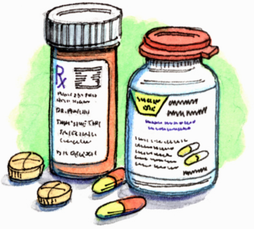|
Comfort and Health My three year old woke up with a runny nose and yucky cough this morning. Still in good spirits, she has started to go about her day, eating breakfast and having her morning coloring time. I gave her some extra IUs of vitamin D3 and a little spoonful of medicinal grade manuka honey (a natural expectorant that will thin secretions). She asked me, “does a cough means sick just like a fever?” We talked about how germs can make us feel yucky, but that our bodies were designed to be smart to get the “yuckies” out with things like coughs and runny noses. Then we sang Daniel Tiger’s song, "Rest is Best”. As I wrote a couple notes in her health journal, I scanned through her previous ailments and became so thankful for her overall health over the last three and a half years. As a first time mom, I have had to research (a lot!) and learn as I’ve gone when it comes to caring for my daughter. From the start I have claimed responsibility for her care and wellbeing. Not only do I have to live with the choices made in regards to her care, but I believe that I am the expert when it comes to her health, as I know her best. I believe that there is a misconception within our western culture: We must be comfortable all of the time. After all, we do have modern conveniences such as air conditioning/heating/etc. But what about when it comes to our health and that of our children? We have over-the-counter pain killers, fever reducers, allergy medication, etc. We do have the option to take advantage of the advancements in modern medicine, but is this always the most beneficial route? I personally believe that our bodies were brilliantly designed. Even in their imperfect state, within an imperfect environment, our bodies have the ability to respond to ailments and heal themselves, most of the time. Intervention for ailments is rarely needed and should only be used when necessary. However, within our culture, unnecessary interventions are used more often than a "wait and see" approach. Sometimes in an effort to speed along the healing process and to keep comfortable in the meantime, we actually end up suppressing our immune system. Treating symptoms confuses our immune response (the reaction of the cells and fluids of the body to the presence of a substance that is not recognized as a constituent of the body itself). We basically unlearn our biologically programmed means to heal, and we become dependent on medications to keep our bodies “healthy”. Here are a few examples of how I’ve seen our culture respond to common ailments:
These examples are that of symptom suppressing. Instead of finding the source of sickness or simply letting the sickness run its course (which makes for a smarter immune system in the long run), we chase the symptom(s) of the sickness with medicine and suppress them. I have come to realize that symptoms are not only our bodies’ way of indicating illness, but often of expelling it as well. A cough, when wet and thin, actually can expel the virus/bacteria out of the body if it is in the respiratory tract. A productive cough brings up a mixture of mucous, irritants, and other substances, clearing the respiratory tract of irritants. Natural expectorants such as medicinal grade manuka honey and eucalyptus essential oil can be used to thin secretions and get “the yuckies” out (1). When a fever is left alone to do its job, it is able to kill virus or bacteria in our bodies. Of course we should use common sense. Every child has a different tolerance for fever temperature, duration of fever, and how fast the temperature rises, but… According to emedicinehealth.com and Aviva Romm, M.D., we should leave a common fever alone. A common fever would be any body temperature between 99-103.5 degrees. Fever is the body's normal and healthy reaction to infection and other illnesses. Fevers help the body fight infection. When a fever reaches 103.5 degrees or above, it is considered a high-grade fever. Many doctors these days are being honest with parents and telling them that a fever this high is no cause for alarm (unless unable to be brought down with natural means). In short, it’s not uncommon, and unless our children are having some other symptoms (breathing difficulty, absolutely no energy, abnormal behavior, or are less than several months old), they don’t need to be rushed to the doctor (2). Lastly, a headache is most often a signal that our bodies are stressed, overtired, and dehydrated. As a side note, It may take some time to wean our bodies from "needing" strong OTC pain relievers if we choose to use gentler means such as essential oils and herbs to manage our discomfort. Each time my daughter has been unwell, I did not rush her to a pediatrician, nor did I pursue medications to “make her well”. My reasons for this are 1. doctors tend to over-prescribe medication, which has lead to more health issues within our culture, and 2. I have not wanted to confuse her immune response with said medications or suppress her necessary symptoms. I am not opposed to seeking medical advice for diagnosing purposes but will always start any "treatment" with the least risk choice. I have yet to need or use stronger means for her body to heal. "This growing awareness that antibiotic overuse is dangerous for both public and personal health requires us to drastically and immediately rethink and adjust our antibiotic use. In doing so we can prevent our children from developing life-long chronic illnesses associated with microbiome damage (antibiotics not only kill bad bacteria in the body but also permanently kill some of the good bacteria needed to fight infection), some of which rival the seriousness of the bacterial infections that used to threaten them, and we can reduce the major global threat of antibiotic resistance we all face.” (3)
"Dr. Martin J. Blaser, a specialist in infectious diseases at the New York University School of Medicine and the director of the Human Microbiome Program, has studied the role of bacteria in disease for more than three decades. His research extends well beyond infectious diseases to autoimmune conditions and other ailments that have been increasing sharply worldwide. In his new book, "Missing Microbes," Dr. Blaser links the declining variety within the microbiome to our increased susceptibility to serious, often chronic conditions, from allergies and celiac disease to Type 1 diabetes and obesity. He and others primarily blame antibiotics for the connection. The damaging effect of antibiotics on microbial diversity starts early, Dr. Blaser said. The average American child is given nearly three courses of antibiotics in the first two years of life, and eight more during the next eight years. Even a short course of antibiotics like the widely prescribed Z-pack (azithromycin, taken for five days), can result in long-term shifts in the body’s microbial environment.” (5) So, what do I do instead? I simply support my daughter’s symptoms, have her rest, keep her hydrated, and she is soon well again. She has experienced roseola at a year old, a single middle ear infection at two years of age, common colds, and viruses. I have never needed to use antibiotics. I did use a fever reducer the first time around, before I researched acetaminophen and its damaging affects on the body and in turn her fever lasted over twice as long as the unmedicated ones that followed. Her coughs, runny noses, and fevers are her body’s means of ridding itself of sickness. By suppressing these symptoms and medicating for comfort’s sake (hers or mine), she would currently have a damaged immune response and less than ideal health in the long run. I know, it can be scary taking responsibility for your child’s health. But more than your friends, family, and even doctor, YOU know your child best. Trust your instincts! That said, sometimes your instincts may lead you to the care of a medical professional. The more that I research and learn, the more that I believe other factors have led to her over all health as well. My girl was born without the use of synthetic hormones or narcotics (of course, birth is unpredictable and intervention can sometimes become medically necessary). She received no antibiotics at birth and beyond. She was exclusively breastfed for the first eleven months of life (nothing but bm!) and then she continued to nurse "full term" (for her, this was just shy of three years). She does not receive over the counter medications, eats a mostly organic/whole foods diet (don’t worry, I let her enjoy treats every now and then), has shared a family bed with her father and I, and lives in a home free of synthetic chemicals. This is by no means “the standard” for health, but I do believe that our choices have led to our daughter’s excellent health. Everyone's way of life is different, but when we have a choice, our aim should be to make decisions that are mindful and evidence based. My hope is to inspire mommas to research for themselves and to listen to the maternal instincts they were designed with. May we embrace without fear the responsibility of our children’s health! *Please do not use this personal testimony or information to diagnose or treat yourself or your children. Seek medical attention when necessary. 1. http://medical-dictionary.thefreedictionary.com/cough
2. http://www.growingupherbal.com/fevers-101/ 3. http://avivaromm.com/protecting-childs-microbiome 4. http://avivaromm.com/sore-throat-kids-need-antibiotic-natural-sore-throat-treatments 5. http://mobile.nytimes.com/blogs/well/2014/07/14/we-are-our-bacteria/?referrer More Reading: -Letting ailments run their course - Article by The Healthy Home Economist -My favorite go to book that compares conventional and holistic treatments by ailment - Smart Medicine. Healthier Child -Acetaminophen does NOT substantially reduce pain - pubmed.gov -Wanting to know more about vaccinations (how and with what they are developed, how they work, their side effects, etc)? - The Parents' Concise Guide to Childhood Vaccinations Comments are closed.
|


